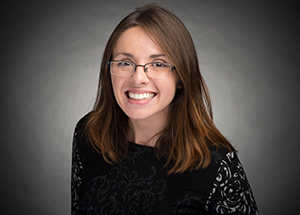Assistant Professor Ehman Published in Special Issue of Psychological Services Journal Angela Draheim November 21, 2022 - 5:24 pm
November 21, 2022

Assistant Professor of Psychology Anandi Ehman and colleagues recently published an article entitled, "Moral injury and psychosocial functioning in healthcare workers during the COVID-19 pandemic" in a special issue on spirtually integrated care of the journal Psychological Services.
Moral injury is defined as “the lasting psychological, biological, spiritual, behavioral, and social impact of perpetrating, failing to prevent, or bearing witness to acts that transgress deeply held moral beliefs and expectations” (Litz et al., 2009, pp. 697). Studies of moral injury among non-military samples are scarce despite repeated calls to examine prevalence and outcomes of moral injury among civilians. The present study examined the prevalence of moral injury, and its relation to psychosocial functioning among healthcare professionals (N=480) during the COVID-19 pandemic. Latent Class Analysis (LCA) revealed four patterns of exposure to moral injury. Individuals in the moral Injury-Self class comprised those who felt they transgressed their own values in addition to witnessing others’ transgressions and being betrayed (11%). These individuals were the most impaired on composite measures of psychosocial functioning. Findings indicate that moral injury is prevalent and has adversely impacted the wellbeing of healthcare professionals during the COVID-19 pandemic.
November 21, 2022

Assistant Professor of Psychology Anandi Ehman and colleagues recently published an article entitled, "Moral injury and psychosocial functioning in healthcare workers during the COVID-19 pandemic" in a special issue on spirtually integrated care of the journal Psychological Services.
Moral injury is defined as “the lasting psychological, biological, spiritual, behavioral, and social impact of perpetrating, failing to prevent, or bearing witness to acts that transgress deeply held moral beliefs and expectations” (Litz et al., 2009, pp. 697). Studies of moral injury among non-military samples are scarce despite repeated calls to examine prevalence and outcomes of moral injury among civilians. The present study examined the prevalence of moral injury, and its relation to psychosocial functioning among healthcare professionals (N=480) during the COVID-19 pandemic. Latent Class Analysis (LCA) revealed four patterns of exposure to moral injury. Individuals in the moral Injury-Self class comprised those who felt they transgressed their own values in addition to witnessing others’ transgressions and being betrayed (11%). These individuals were the most impaired on composite measures of psychosocial functioning. Findings indicate that moral injury is prevalent and has adversely impacted the wellbeing of healthcare professionals during the COVID-19 pandemic.
